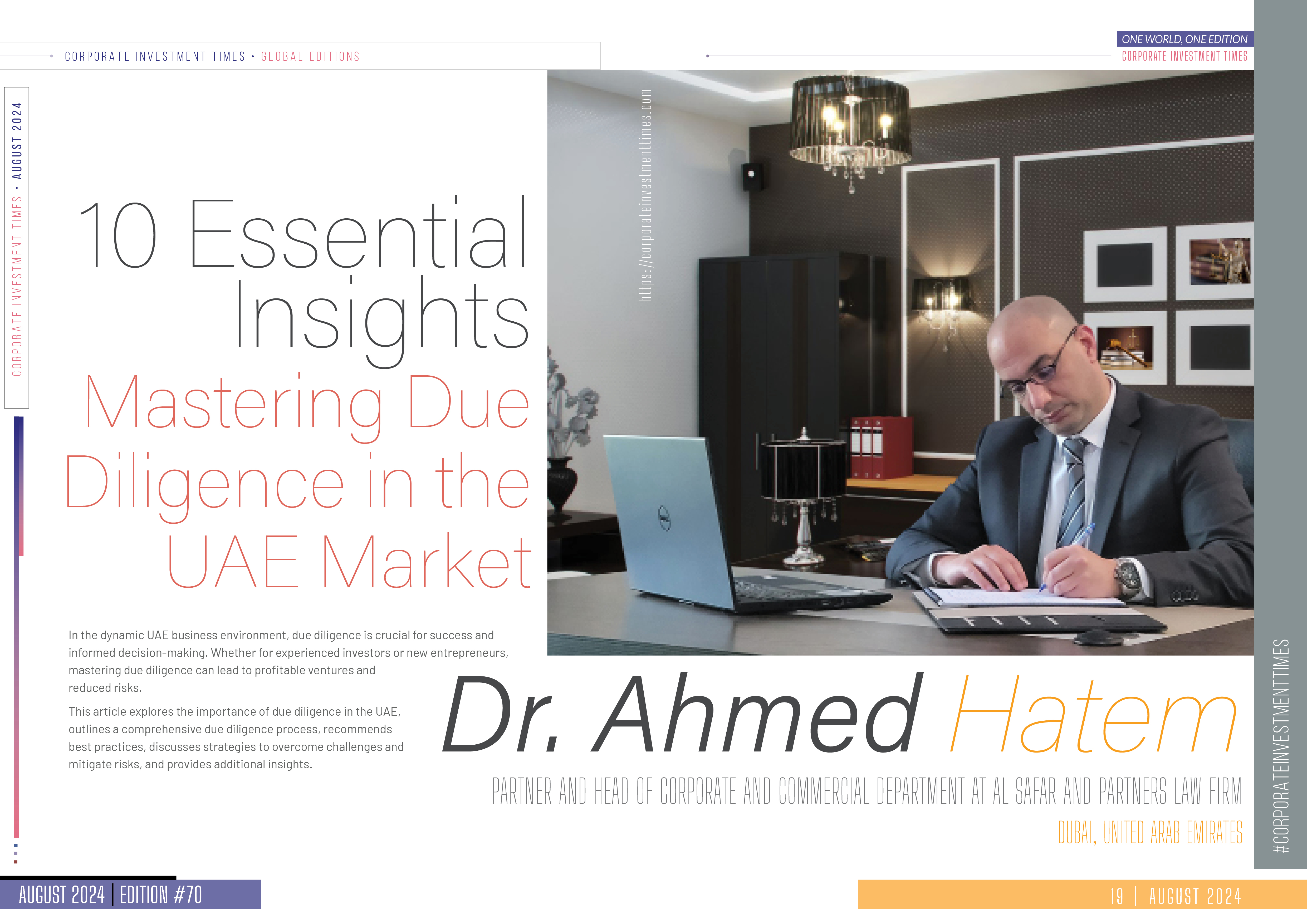In the dynamic UAE business environment, due diligence is crucial for success and informed decision-making. Whether for experienced investors or new entrepreneurs, mastering due diligence can lead to profitable ventures and reduced risks.
This article explores the importance of due diligence in the UAE, outlines a comprehensive due diligence process, recommends best practices, discusses strategies to overcome challenges and mitigate risks, and provides additional insights.
This article explores the importance of due diligence in the UAE, outlines a comprehensive due diligence process, recommends best practices, discusses strategies to overcome challenges and mitigate risks, and provides additional insights.
The Significance of Due Diligence in the UAE Market
The UAE market, with its diverse opportunities, attracts global investors and entrepreneurs. Due to its unique characteristics and regulatory nuances, thorough due diligence is essential. For example, in Dubai’s tech sector, neglecting due diligence can lead to overlooking crucial factors like regulatory compliance and financial health, jeopardizing investments. Due diligence is vital for informed decisions, risk mitigation, and long-term success. Understanding local market dynamics, cultural aspects, and regulatory changes provides a strategic advantage, aligning operations with local expectations and opening doors to new opportunities.
Key Components of a Comprehensive Due Diligence Process
To effectively undertake due diligence, it is crucial to follow a structured approach, considering the following key components:
Legal and Regulatory Compliance
Ensure the target entity complies with UAE laws and industry-specific regulations. Check for any ongoing litigation or regulatory sanctions that might impact the transaction. Understanding the legal framework and compliance requirements helps protect your investment and prevent future legal issues. Consulting with local legal experts who can provide insights into recent regulatory changes and how they might impact your transaction is also important. Staying abreast of legal developments ensures that your investment remains compliant and avoids any potential legal pitfalls that could arise from non-compliance.
Financial Analysis
Conduct an in-depth examination of the target company’s financial health. Review financial statements, cash flows, and key performance indicators to evaluate stability and growth prospects. Financial analysis provides insights into the company’s profitability, liquidity, and overall financial well-being. This step also includes assessing the company’s historical financial performance, which can reveal trends and patterns that might impact future performance. Moreover, evaluating the financial strategies employed by the company, such as debt management and investment approaches, can provide a deeper understanding of its financial robustness.
Operational Assessment
Assess the operational aspects of the business, including supply chain management, technology infrastructure, and human resources. Identify any inefficiencies or operational risks that could affect the transaction. Understanding the operational dynamics helps evaluate the company’s efficiency, scalability, and growth potential. It’s also essential to consider the company’s operational resilience, particularly how it has managed disruptions in the past. This can offer insights into its ability to navigate future challenges and maintain business continuity. Additionally, evaluating the company’s technological adaptability and innovation capacity can indicate its potential for future growth and competitiveness in the market.
Intellectual Property Rights
Verify the ownership and protection of the business’s intellectual property rights, including trademarks, patents, and copyrights. Ensuring the company has secured its intellectual property rights protects against infringement claims and strengthens its competitive edge. It’s also crucial to evaluate the scope and duration of these protections and any potential risks related to intellectual property disputes. Understanding the strategic value of the company’s intellectual property portfolio can provide insights into its long-term competitive advantage and market positioning.

Market and Competitive Analysis
Analyze the market dynamics and competitive landscape in which the target operates. Assess market trends, customer demographics, and competitive positioning to gauge the business’s growth potential. Market and competitive analysis help identify opportunities, assess market share, and anticipate future challenges. This step also involves examining the company’s marketing strategies and customer engagement practices. Understanding how the company differentiates itself from competitors and its approach to customer retention can provide valuable insights into its market strength and potential for sustainable growth.
Engage Expert Advisors
Leverage the expertise of legal advisors, financial analysts, and industry specialists familiar with the UAE market’s intricacies. Their insights and guidance can streamline the due diligence process and uncover hidden risks. Furthermore, engaging with advisors who have a deep understanding of local market conditions can provide strategic insights that enhance the overall due diligence process. Their knowledge of industry-specific challenges and opportunities can help tailor your due diligence efforts to better suit the unique aspects of the UAE market.
Utilize Technology Solutions
Adopt technology-driven due diligence tools and platforms that automate data collection, analysis, and reporting. These solutions enhance efficiency, accuracy, and reliability in decision-making, allowing for faster and more comprehensive data analysis. Additionally, utilizing advanced analytics and machine learning algorithms can provide deeper insights into patterns and trends that might not be immediately apparent. Embracing digital solutions not only streamlines the due diligence process but also enhances the accuracy and depth of the analysis, leading to more informed decision-making.
Maintain Transparency and Communication
Foster open communication channels with the target company throughout the due diligence process. Transparent discussions and mutual collaboration build trust and facilitate smoother transactions. Effective communication ensures concerns or issues are promptly addressed, leading to a more efficient due diligence process. Furthermore, establishing clear communication protocols and regular updates can help manage expectations and keep all parties aligned throughout the process. This proactive approach to communication can also help mitigate potential conflicts and ensure a more seamless transaction.
Stay Updated on Regulatory Changes
Keep abreast of the evolving regulatory landscape in the UAE market to mitigate compliance risks. Regularly monitor legal updates and seek guidance from regulatory experts to navigate potential challenges. Staying informed about regulatory changes helps adapt your due diligence approach and ensures compliance with the latest regulations. Additionally, participating in industry forums and engaging with regulatory bodies can provide valuable insights into upcoming regulatory changes and their potential impact on your investment. This proactive approach to staying informed can help you anticipate and prepare for regulatory shifts, ensuring ongoing compliance and strategic alignment.
Overcoming Challenges and Mitigating Risks
Despite meticulous planning, due diligence in the UAE market may encounter hurdles such as cultural differences, language barriers, and bureaucratic red tape. To mitigate these risks, consider That the UAE’s cultural diversity necessitates understanding local customs and business practices. Engage local advisors with deep knowledge of the culture and business environment to bridge cultural gaps and provide valuable insights. Additionally, investing time in cultural training and awareness programs for your team can enhance their ability to navigate cross-cultural interactions effectively. Understanding cultural nuances and business etiquette can foster stronger relationships and facilitate smoother negotiations.
Additional Insights
Beyond the key components and best practices of due diligence, consider the following additional insights in the context of the UAE market:
Legal and Regulatory Considerations
The UAE’s robust legal system governs various aspects of business operations, including company formation, commercial contracts, labor laws, and intellectual property rights. Compliance with these laws is crucial to avoid legal complications and ensure smooth transactions. Engaging legal experts well-versed in UAE laws and regulations can help identify legal risks and compliance issues. Additionally, understanding the procedural requirements and timelines for regulatory approvals can help streamline the due diligence process and avoid unnecessary delays.
Sector-Specific Due Diligence
The UAE market comprises diverse sectors such as real estate, hospitality, finance, technology, and energy. Each sector has unique dynamics, challenges, and regulatory requirements. Conducting sector-specific due diligence is essential for understanding the target company’s industry landscape, market trends, and competitive positioning. This specialized analysis helps assess sector-specific risks and opportunities. Additionally, leveraging sector-specific benchmarks and performance metrics can provide valuable context for evaluating the target company’s performance and growth potential within its industry.
Financial Due Diligence
Financial analysis in the UAE market involves reviewing financial statements, cash flows, tax compliance, debt obligations, and financial projections. Understanding the company’s financial health and stability is crucial for assessing its ability to generate profits, manage liabilities, and sustain growth. Collaborate with financial experts to identify red flags and mitigate financial risks. Moreover, assessing the company’s capital structure and funding sources can provide insights into its financial flexibility and ability to support future growth initiatives.
Cultural and Business Etiquette
Understanding cultural norms and business etiquette is vital for successful due diligence in the UAE. Building strong relationships and respecting cultural nuances enhance trust and effectiveness in business negotiations. Additionally, recognizing the importance of personal connections and relationship-building in the UAE business environment can help facilitate smoother interactions and negotiations. Demonstrating cultural sensitivity and respect can also strengthen your reputation and foster long-term partnerships.
Cybersecurity and Data Protection
With increasing reliance on digital infrastructure, assessing the target company’s cybersecurity measures and data protection policies is essential. Engaging IT and cybersecurity experts can help identify vulnerabilities and recommend measures to enhance data security. Furthermore, evaluating the company’s compliance with international data protection standards and regulations can provide insights into its commitment to safeguarding sensitive information. Implementing robust cybersecurity practices can also protect your investment from potential data breaches and cyber threats.
Reputation and Brand Image
Conduct due diligence on the target company’s reputation, brand perception, and customer satisfaction. Analyzing online reviews, social media presence, and customer feedback helps gauge public perception and identify reputational risks. Additionally, assessing the company’s brand equity and market positioning can provide insights into its competitive advantages and potential for future growth. Understanding the company’s reputation and brand image can also help identify areas for improvement and potential opportunities to enhance its market standing.
Post-Acquisition Integration
Post-acquisition integration involves aligning operations, systems, and culture of the acquired company with the acquiring entity. Conduct comprehensive integration due diligence to identify potential challenges, synergies, and strategies for a smooth transition. Additionally, developing a detailed integration plan that outlines key milestones, responsibilities, and timelines can help ensure a successful integration process. Engaging with key stakeholders and maintaining open communication throughout the integration phase can also facilitate a smoother transition and maximize the value of the acquisition.
Conclusion
Due diligence is essential in the UAE market for informed decision-making, risk mitigation, and venture success. By understanding the legal, regulatory, financial, cultural, and reputational aspects, stakeholders can navigate the market complexities and achieve long-term success. Utilizing expert advisors, technology solutions, and transparent communication enhances due diligence effectiveness. Incorporating due diligence into business strategies helps stakeholders seize opportunities and minimize risks.
For additional information, please contact Al Safar & Partners at +971 4 422 1944 ext. 720 or +971 55 763 0405. You can also reach us via email at reception@alsafarpartners.com Learn more about our services by visiting our website at www.alsafarpartners.com
Disclaimer: This article is for informational purposes only and should not be considered legal advice.




